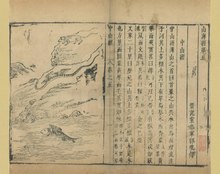| Classic of Mountains and Seas | |||||||||||||||||||
|---|---|---|---|---|---|---|---|---|---|---|---|---|---|---|---|---|---|---|---|
 Scrollable pages from volume five of the Classic of Mountains and Seas, a Ming dynasty (1368–1644) woodblock printed edition | |||||||||||||||||||
| Traditional Chinese | 山海經 | ||||||||||||||||||
| Simplified Chinese | 山海经 | ||||||||||||||||||
| Literal meaning | "Classic of Mountains and Seas" | ||||||||||||||||||
| |||||||||||||||||||



The Classic of Mountains and Seas, also known as Shanhai jing (Chinese: 山海经),[1] formerly romanized as the Shan-hai Ching,[2] is a Chinese classic text and a compilation of mythic geography[3][4] and beasts. Early versions of the text may have existed since the 4th century BCE,[5][6] but the present form was not reached until the early Han dynasty.[6] It is largely a fabulous geographical and cultural account of pre-Qin China as well as a collection of Chinese mythology.[citation needed] The book is divided into eighteen sections; it describes over 550 mountains and 300 channels.
- ^ "Shan Hai Jing". Chinese Text Project.
- ^ Jonathan H. Ping; Brett McCormick (14 December 2015). China's Strategic Priorities. Routledge. pp. 40–. ISBN 978-1-134-59229-6.
- ^ Lewis, Mark Edward (2006). The Flood Myths of Early China. State University of New York. p. 64. ISBN 978-0-7914-6663-6.
- ^ Mark Edward Lewis (2009). China's Cosmopolitan Empire: the Tang dynasty, Vol. 4 (illustrated ed.). Harvard University Press. p. 202. ISBN 978-0-674-03306-1. Retrieved February 8, 2012.
- ^ Leo Bagrow, R. & A. Skelton (2009). History of cartography. Transaction Publishers. p. 204. ISBN 978-1-4128-1154-5.
- ^ a b Lust, John (1996). Chinese popular prints. Brill Publishers. p. 301. ISBN 90-04-10472-0.